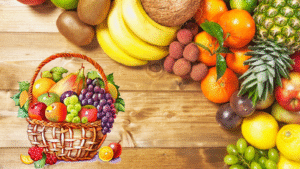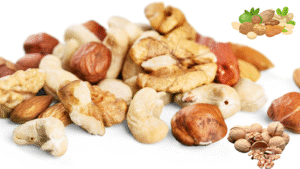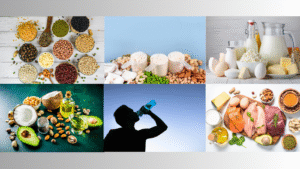Pregnancy is among the most significant phases of the life of a woman and requires careful consideration of eating habits and lifestyle. The food she eats affects the baby’s growth in brain development, overall immunity strength, and future health. A nutritious and balanced diet during pregnancy does not just reduce problems but also helps support the well-being of mother and baby.
This comprehensive guide explains the best foods to eat during pregnancy—fruits as well as nuts, vegetables, and more food groups—as well as their advantages, supported by the latest research on nutrition.
Importance of Nutrition in Pregnancy
The nutritional needs for a pregnant woman are increased dramatically due to the fact that the body is supporting the mother as well as the developing fetus. Essential nutrients like iron, folic acid, calcium, omega-3 fatty acids, and proteins play an important role. In the event of a deficiency, any of these can result in issues such as anemia or low birth weight or developmental issues for the infant.
Fruits to Eat During Pregnancy

Fruits are an incredible source of minerals and vitamins as well as antioxidants and fiber. Consuming a wide variety of fruit every day ensures better hydration, digestion, and increased immunity.
1. Bananas
-
Potassium is a potent mineral that assists in regulating blood pressure.
-
Helps prevent fatigue and leg cramps.
-
Provides quick energy.
2. Oranges
-
A great food source for vitamin C to increase the immune system.
-
Aids in absorption of iron and reduces the risk of anemia.
-
Provides folate, essential for neural tube development.
3. Apples
-
Improve digestion thanks to the high fiber.
-
Reduces the chance of suffering from asthma and allergies.
-
Keep blood sugar stable.
4. Berries (Blueberries, Strawberries, Raspberries)
-
A good source of antioxidants for babies’ brains and development of cells.
-
Incorporates vitamin C, fiber, and folate.
-
Improve skin health and increase the immune system.
5. Mangoes along with Papayas (ripe but not unripe)
-
Rich in vitamin A and beta-carotene for skin and eye health.
-
Give digestive enzymes to help reduce constipation.
6. Pomegranates
-
Filled with antioxidants and iron.
-
Improves hemoglobin levels.
-
Helps maintain cardiovascular health.
Tips: Wash fruits thoroughly. Avoid papaya that is not ripe, and consume seasonal fruits to reap the maximum benefits.
Nuts and Seeds for Pregnancy

Nuts are rich in nutrients, providing nutritious fats, proteins, and minerals. A small amount of nuts every day can help develop brain health and reduce the risk of pregnancy-related complications.
1. Almonds
-
Give vitamin E, calcium, and fiber.
-
Enhance brain development and memory of the infant.
-
Improve skin health.
2. Walnuts
-
A rich source of omega-3 fatty acids that are essential for the baby’s brain and eye development.
-
Reduce inflammation.
-
Improve sleep quality.
3. Cashews
-
A good source of iron and magnesium.
-
Boost hemoglobin levels.
-
Promote bone health.
4. Pistachios
-
Filled with protein and fiber.
-
Help manage blood sugar levels.
-
Improve your heart health.
5. Chia Seeds & Flaxseeds
-
Rich in omega-3 fatty acids as well as fiber.
-
Eliminate constipation.
-
Encourage neurodevelopment in the infant.
Notice: Nuts should be taken in moderation so as to avoid excessive calories. If you are allergic, consult an allergist prior to including them.
Vegetables to Include During Pregnancy

Vegetables are high in minerals, vitamins, and antioxidants. They also supply folate and fiber, which help to reduce the constipation issue and assist in digestion.
1. Leafy Greens (Spinach, Kale, Fenugreek, Broccoli)
-
High in folic acid, it helps stop neural tube deformities.
-
Calcium and iron are important to support bone health and blood health.
-
Support detoxification.
2. Carrots & Sweet Potatoes
-
An excellent food source for beta-carotene (Vitamin A).
-
Improve vision, skin, and the immune system.
3. Beetroot
-
A high content of iron and folate.
-
Improves hemoglobin levels and blood circulation.
-
Reduces the risk of anemia.
4. Tomatoes
-
It is a potent antioxidant.
-
Improve the health of your skin and heart.
5. Bell Peppers
-
Rich in Vitamin C.
-
Aid in the absorption of iron.
-
Boost immunity.
6. Cucumbers & Zucchini
-
Water-rich vegetables that have high content.
-
Avoid swelling and dehydration.
Other Essential Foods in Pregnancy

1. Whole Grains
-
Oats, brown rice, quinoa, and whole wheat are rich in fiber and B vitamins.
-
Keep your energy levels in check.
2. Protein Sources
-
Eggs, lean meats, lentils, and legumes aid in the development of tissue and muscle.
-
Essential to the development of a baby.
3. Dairy Products
-
Milk, curd, and cheese are rich in calcium as well as vitamin D.
-
Build up your bones and teeth.
4. Healthy Fats
-
Ghee, olive oil (in moderation), and avocado increase absorption of nutrients.
5. Hydration
-
Drinking enough fluids is vital to avoid infections of the urinary tract and dehydration.
-
Coconut water contains electrolytes that naturally occur.
Foods to Avoid During Pregnancy
-
Raw papaya, pineapples, and even raw papaya can induce contractions.
-
Unpasteurized cheese and milk.
-
Fish, meat, and eggs (risk of getting sick).
-
Caffeine in excess.
-
Junk food products that are high in trans fats and preservatives.
Key Benefits of Eating Right During Pregnancy
-
Healthy Baby Development—Supports the development of bones, brains, and organs.
-
Reduced pregnancy complications Prevents gestational diabetes, hypertension, and anemia.
-
Improved Digestion—Fiber-rich foods reduce constipation.
-
Improved Immunity Vitamins and minerals help strengthen the mother as well as the baby.
-
Higher Energy Levels A balanced diet can reduce fatigue.
-
Healthy Birth Weight reduces the chances of premature birth and babies with low weight.
Final Thoughts
The key to a balanced pregnancy is choosing the appropriate mix of fruits, vegetables, proteins, nuts, and whole grains to satisfy your daily nutritional needs. A properly planned diet will ensure an easy pregnancy, an easy delivery, and a solid base for the baby’s well-being.
Always consult with a physician or dietitian prior to making major diet changes, particularly for those with conditions such as thyroid disease, diabetes, or hypertension.

